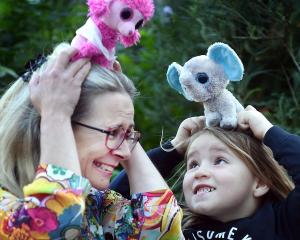A University of Otago academic has been chosen to be the first patient ambassador for the newly formed Lung Foundation of New Zealand.
Dr John Ashton, a senior lecturer at the School of Pharmacology and Toxicology, was diagnosed with lung cancer two years ago, even though he was fit and a non-smoker. According to the Asthma Foundation, about one in 10 people who develop lung cancer are non-smokers.
''I hope that I can give people some inspiration that this horrible disease can be fought,'' Dr Ashton said.
''And to not give up hope.''
Dr Ashton and his wife were on holiday with their two children in Northland when his wife picked up a Reader's Digest article on cancer trials in Australia and New Zealand.
He had been diagnosed with advanced lung cancer in mid-2013, and since the diagnosis he had been ''taking a lot of holidays and drinking a lot of wine'', Dr Ashton said.
''I was preparing for the worst and hoping for the best,'' he said.
His cancer had not responded to two rounds of chemotherapy, or to a range of drugs. But instead of succumbing to depression, Dr Ashton kept active, published five scientific papers and spent quality time with his family.
''When you see there might be an end point ahead of you, it can help you focus on what's most important. I was at my son's soccer practice an hour after my diagnosis,'' he said.
According to the Lung Foundation of New Zealand, 1600 people die every year from lung cancer and there are almost 2000 new cases annually.
''There is a stigma around lung cancer, which really annoys me,'' Dr Ashton said.
''Like, you brought this on yourself - that's really unfair and inaccurate.''
Dr Ashton contacted a researcher in Australia about being part of her clinical trial. Although he was not eligible for her trial, she referred him to a colleague in Auckland, oncologist Mark McKeage, who started him on a new drug not available in New Zealand at the time, crizotinib.
A self-confessed ''geeky scientist'', he had been tracking his health since his diagnosis with a range of detailed charts and graphs, Dr Ashton said.
''It was good data,'' he said.
On one of the graphs he charted his running ability. Before starting on crizotinib Dr Ashton could only run for 10 seconds - two months into treatment and he could run as long as he liked. And nine days after starting medication, the persistent cough had finally ceased.
''I take two pills every day and I have no side effects and no noticeable indicators of the disease. I am in remission,'' Dr Ashton said. He is now training for a half-marathon.
Last week, The Lung Foundation of New Zealand was launched and chief executive Philip Hope said Dr Ashton's problem-solving skills and personal experience of the disease made him ''a very relevant voice''.
''John is a very brave and unselfish man, who with the support of his family has chosen to help our cause by sharing his story in order to help other people that have been diagnosed with lung cancer,'' Mr Hope said.
''John is proof that you don't need to have smoked to get lung cancer. However, he isn't letting cancer define him.''
Dr Ashton said he did not like it when people called him ''brave''. The reason he was able to stay positive was because he still had ''so much to do; I want to make a contribution to this world''.
LUNG STATISTICS
*Almost 140 people are admitted to hospital in New Zealand every day with serious lung conditions.
*12 people die every day as the result of a serious lung condition.
*Lung cancer is a major killer of New Zealanders, with 1600 dying each year and almost 2000 new cases each year.
*Lung cancer is a major cause of disparity in health outcomes between Maori and non-Maori, lung cancer rates being four times higher among Maori women and two and a-half times higher among Maori men.
*Research showsonly 37% of New Zealand adults have ever talked to their doctor about the health of their lungs.
Source: Lung Foundation of New Zealand
- By Eleanor Ainge Roy













